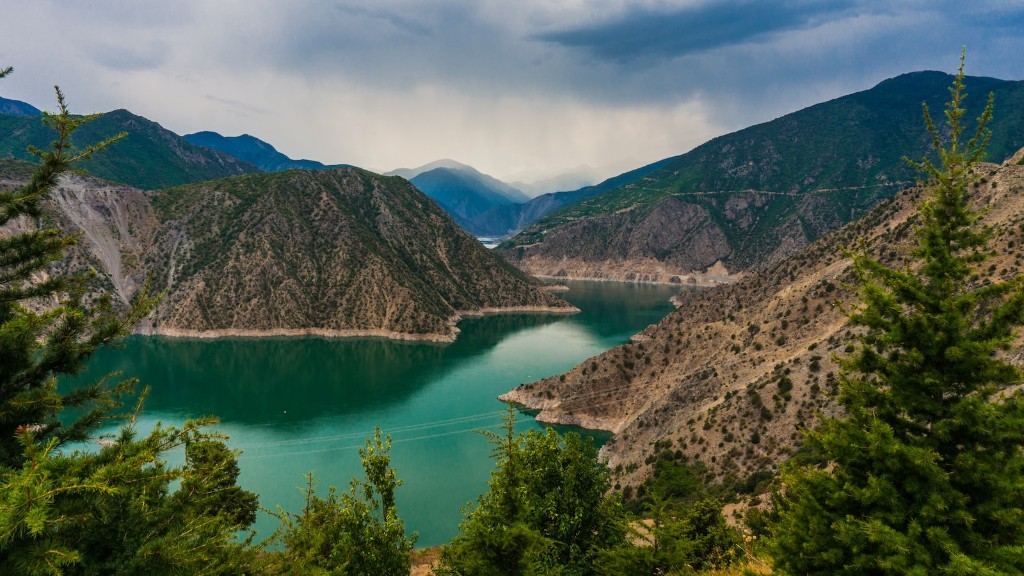Istanbul, located on the borders of Europe and Asia, is one of the world’s most influential cities. It has been an important commercial and cultural center for centuries, and has been a cultural epicenter for art, music, literature, fashion, and cuisine. Istanbul lies along the Bosphorus Strait, a channel that connects the Mediterranean Sea to the Black Sea. Also referred to as the “City of Seven Hills”, Istanbul is geographically located both in Europe and Asia, straddling the continents like a bridge.
Istanbul is the only city in the world located on two continents, which has enabled it to become a prosperous and influential city. It is the economic, political, and cultural capital of Turkey and continues to be one of the most important cities on the European-Asian border. Istanbul has been listed as one of the world’s thirty most populous metropolitan cities and continues to be a major global city. This has no doubt contributed to the city’s current economic and cultural influence, and to its being a major financial center in the region.
The city of Istanbul can be found located in northwest Turkey, towards the southeastern end of the Sea of Marmara, and is divided by the European Bosphorus Strait. Istanbul spans both sides of the Bosphorus Strait, with the European side being called Thrace (also known as Rumelia), and the Asian side is Anatolia (also known as Asia Minor). Istanbul exists between 40° and 41°N latitude and between 28° and 29°E longitude, and is therefore also at the edge of the Black Sea, which gives it a mild Mediterranean climate due to the warmer air rising from the sea.
Everyday Life In Istanbul
Everyday life in Istanbul revolves around the Bosphorus Strait and its coastline, where its citizens and tourists explore the shorelines and its drawn-out fish market, which has become a popular spot for visitors. Thrace and Anatolia are joined by the 15-kilometer in length Bosphorus Bridge, which officially connected the two sides in 1973. The city is also fed by the ancient Hippodrome, which was used for chariot races, and now serves as a tourist attraction. Istanbul has plenty of cultural highlights, where the travelers can witness the hustle and bustle of its daily activities; from its main streets and bazaars to its many mosques and sites of historical significance.
Istanbul is home to some of the grandest Ottoman palaces and monuments, as well as four UNESCO World Heritage Sites. Most notably, the Sultanahmet Mosque, commonly referred to as the Blue Mosque, is a testament to the Ottomans’ strong foothold in the city’s history. Istanbul is also home to a thriving art scene, where creative minds are constantly producing new masterpieces. Between contemporary art galleries, live music performances, and the city’s many cultural festivals, there’s no shortage of entertainment.
Istanbul also boasts four of the world’s most important universities, making it a hotbed for the latest academic and technological trends. The city is also known for its various food and shopping options, which visitors can explore in its more than 4,000 dining and shopping venues. And finally, Istanbul is an excellent tourist destination, with some of the world’s finest hotels, packed full of amenities to make your stay memorable.
Implications On International Relations
Istanbul, due to its geopolitical location, gives it an important role in the development of international relations, particularly between Europe and Asia. The international airport of Istanbul is the primary link between the two continents, as it serves as an important hub for travelers visiting the region. Its strategic location also gives it strong ties to the intelligence services of different countries, which can provide a variety of information regarding its citizens, trade, and overall regional security.
At the same time, the city has become an important cultural and economic hub between both continents. Istanbul has become a favorite destination for international events, conferences, artistic and cultural festivals, and scientific and research initiatives. It is also a popular tourist destination, and continues to attract tourists from all over the world due to its unique combination of eastern and western cultures, as well as its metropolitan lifestyle.
Istanbul is known for its diversity and inclusivity, which can be seen by its population’s mix of religious backgrounds, which include Muslims, Christians, and Jews. This is a trait that has allowed for a variety of perspectives to co-exist, which in turn gives the city an opportunity to grow while maintaining an extraordinary level of tolerance and understanding.
Global Influence Of Istanbul
Istanbul is an integral part of global culture, as it is home to a great variety of people from all around the world. The city is well known for its cultural heritage, its stunning architecture, its vibrant and diverse fashion industry, and its many notable figures in the arts and music scene.
It has provided international companies with the opportunity to invest in the city, or to use it as a base for their operations in the region. Its importance as an economic and cultural catalyst means Istanbul continues to have a strong relevance in global affairs. Its ties to the economy, politics, and international relations, as well as its expanding tourism industry, make it an invaluable asset to the world’s map.
Istanbul also has a large media presence, with many local and international news outlets operating in the city. This also contributes to the city’s importance in the global space, as its vibrant, ever-developing relationship with the world allows for different perspectives on matters of international affairs, giving the city a unique insight on global issues. This makes Istanbul an essential part of the global discussion and helps shape the future of the region.
Modern Landmarks Of Istanbul
Istanbul is dotted with modern landmarks that pay homage to the city’s past, present, and future. From the iconic Galata Tower to the brand new Hamidiye Mosque, the city is filled with awe-inspiring landmarks that invite its visitors and inhabitants to explore and enjoy.
The Istanbul Tower stands 207 meters tall, and is the tallest structure in the city. It gives visitors a spectacular view of the city skyline, with its golden domes and spires that glimmer against the night sky. Along the Bosphorus Strait, there are numerous bridges that connect the two sides of the city, including the newly opened Yavuz Sultan Selim Bridge, the third bridge over the strait.
Istanbul also has an array of malls, entertainment centers, and other modern facilities that allow visitors to ease into the convenient side of the city. Modern day Istanbul is now home to world class hotels, grand event venues, endless entertainment options, and a variety of shopping centers. These can be found all around the city, including at the popular Taksim Square, which has become the center of cosmopolitan culture in Istanbul.
Athletic Venues Of Istanbul
Istanbul has an array of athletic venues that serve athletes and fans alike. The city boasts top-notch football venues throughout the city, such as Başakşehir Stadium, Recep Tayyip Erdoğan Stadium, and Vodafone Park, as well as tennis courts, swimming pools, and numerous other sports facilities. For those who prefer to hit the outdoors, Istanbul also boasts some of the world’s most memorable hiking trails.
For those looking for a more creative outdoor activity, the city offers several unique public art galleries, such as PARK 4DTA, which offers a variety of experimental and traditional art projects. There are also parks and gardens located in several parts of the city, where visitors can enjoy the city’s verdant landscapes and lush gardens.
Istanbul has also become an important sports hub, and can regularly be seen hosting international football matches, as well as the UEFA Champions League final. This helps bring the city to the attention of fans around the globe, which further contributes to its global influence.
Climate Of Istanbul
Istanbul’s climate is generally temperate, with mild winters and warm summers. Rainfall is modest throughout the city, and makes up for the generally low amount of snow the city receives in the winter. The weather is also mostly influenced by the Mediterranean Sea, and is known to be quite sunny in the summer months.
In terms of temperature, Istanbul experiences warm, humid summers with temperatures between 25°C and 35°C, and during the winter, temperatures often range from 0°C to 10°C. The city is also home to one of the world’s most unique wind systems, the tousled by warm winds from the Aegean Sea and cold winds from the Black Sea, which often makes the climate more unpredictable.
Istanbul also has a wide range of natural terrain, from its temperate forests to its rocky coastlines, making it an ideal location for outdoor activities, as well as for a variety of other recreational activities. This makes the city unique in terms of its climate and scenery, and gives it the allure of a truly international city.





